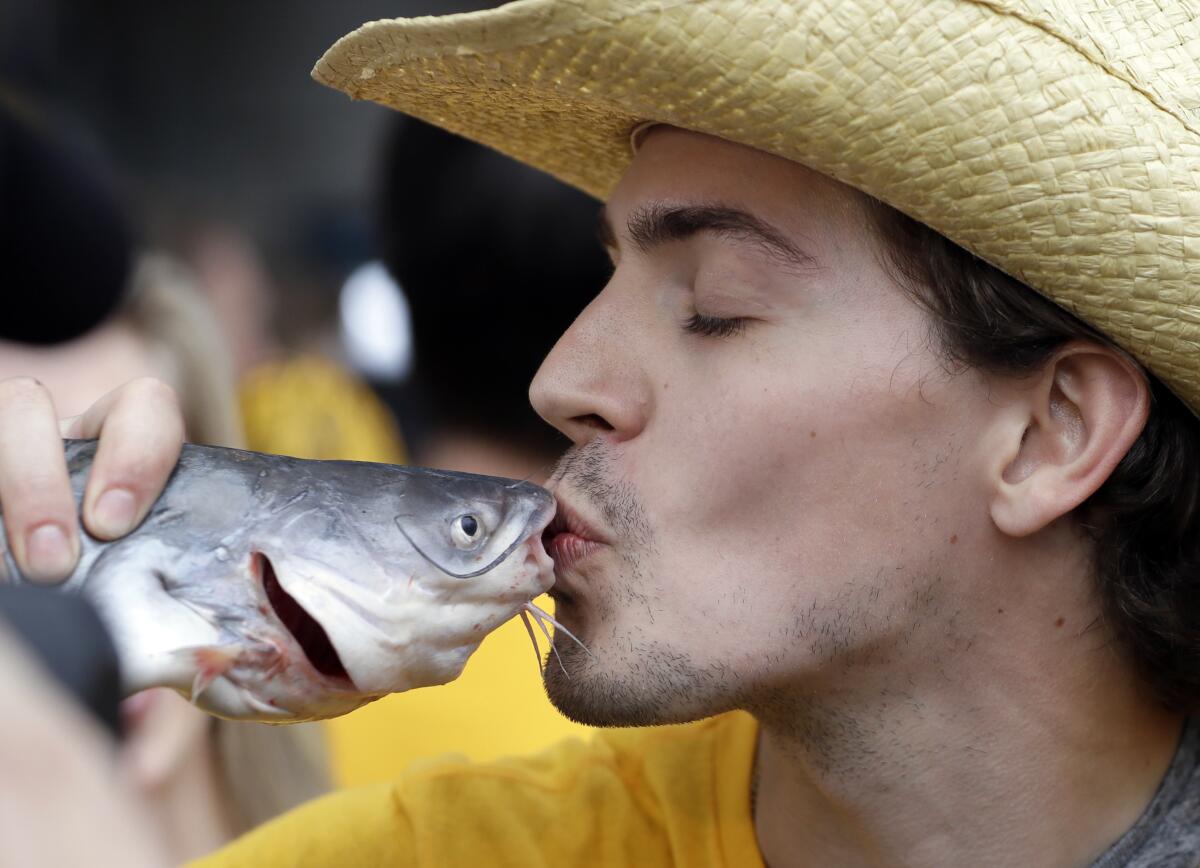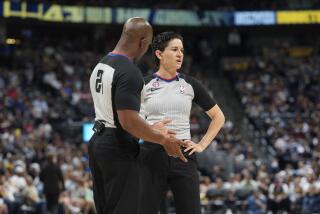What exactly is catfishing and why did NBA Twitter fall for Vivian Flores?

- Share via
Catfish are aquatic animals known for their barbels that look like whiskers around their lips. These creatures became part of hockey tradition when Nashville Predators fans started tossing the fish onto the ice in the early 2000s to celebrate a victory over the Detroit Red Wings. It’s a knockoff of a more famous tradition that Red Wings fans have of throwing celebratory octopuses on the ice, but that’s another story.
Baseball fans are familiar with Hall of Fame pitcher Jim “Catfish” Hunter, who won five World Series and more than 200 games throughout the 1970s in a Hall of Fame career with the Oakland A’s and New York Yankees.
Basketball fans were reintroduced this week to yet another catfish when a report that Lakers fan Vivian Flores — who had built a large and engaged following on social media — was reported missing over the weekend by her podcast co-host, Josh Toussaint. As the news circulated, Flores’ identity came into question. Several pieces of her story weren’t adding up and fans came to the conclusion that they had been duped in their expressions of concern for her safety.
A report that Lakers fan Vivian Flores went missing Sunday unlocked a wormhole of catfishing possibilities that pulled Markieff Morris and Kevin Durant into its maw.
The term “catfish” was coined in 2010 with the launch of the documentary of the same name. The documentary told the story of photographer Nev Schulman, who believed he was building a friendship with a young artist and a romantic relationship with her sister on Facebook. Neither the girl nor her sister were real but had been fabricated by a 40-year-old woman, married it turned out, who had created an online world of fictitious characters leading lives more glamorous than her own. The woman’s husband created the catfish metaphor, explaining how catfish were packaged with large shipments of cod to keep them fresh and active during their long trips from Alaska to China. (Yeah, we found the metaphor a little esoteric too.)
“There are those people who are catfish in life and they keep you on your toes,” the husband said. “They keep you guessing, they keep you thinking, they keep you fresh.”
‘Catfish’ blurs line between documentary and feature film
“Catfish” became popular slang for people who tricked others into building an online relationship with a fake person. There is even a hit reality television show called “Catfish” on MTV hosted by Schulman that helps people discover if their online lovers are real. In 2020 the program completed its eighth season, its popularity renewed by the increase in online relationships created by the COVID-19 pandemic.
Signs that you are being catfished include a refusal by your online partner to take video calls or meet in person. This was one red flag raised in the case of Flores, whom Toussaint, her podcast co-host, revealed he had never actually met.
Catfishing is hardly new to the sports world. In fact, it’s a rather famous practice. In 2020 Notre Dame linebacker Manti Te’o was catfished during his senior year of college. That fall, Te’o shared the story of Lennay Kekua, whom he had met online and started dating before she died of leukemia that year. The story was amplified by the success of Te’o, who would be a Heisman Trophy finalist, and his team, which made a surprise run to the national championship game. Shortly after the national title game in 2013, Deadspin published an investigation revealing Kekua to be a hoax, which Te’o and his family had already learned.
Mutations of catfishing have popped up over the years. Brooklyn Nets star Kevin Durant, for example, has caught flak for using burner accounts on Twitter. This is where someone uses an anonymous or lesser-known account to interact on social media without revealing his or her identity. The NBA champion’s ruse was up in 2017 when he accidentally responded to a fan with his verified account. He later explained on ESPN’s “The Boardroom” that he tries to have more authentic conversations with friends and family on his burner account than he could on his official platform, which has 19 million followers.
More to Read
Go beyond the scoreboard
Get the latest on L.A.'s teams in the daily Sports Report newsletter.
You may occasionally receive promotional content from the Los Angeles Times.











